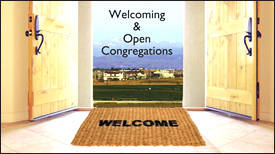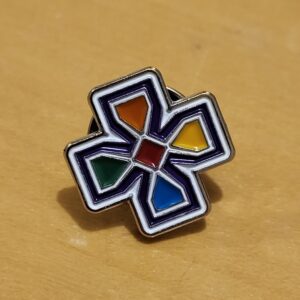Presentation to C of I Bishops’Conference on Sexuality
in the Context of Christian Belief
by Canon Ginnie Kennerley, March 2012
I’m very pleased and a little nervous to be here with you today with The Revd Barry Forde, and both of us are agreed that we are here in pursuit of mutual understanding, not to promote any further polarisation of our two constituencies. But to do that we both have to state our positions honestly. I hope you can help us draw closer together.
As I said in the foreword to this book, (Moving Forward Together: Homosexuality and the Church of Ireland) the disagreement about sexuality now disrupting the Church is hugely regrettable. And if we’re to go forward together we do have to learn to disagree more agreeably, especially about Gay Clergy.
There are strong feelings at both ends of the spectrum – and in the middle a lot of people who don’t share this great concern with sexuality. We have all to learn to respect one another, finding our path in the light of scripture, tradition and reason, as in the Anglican Communion we have always done. We need to recognise that while we don’t agree in detail on all our convictions, we can be a powerful force for good so long as we agree on essentials – the love of God shown to us in Christ and our dependence on the Holy Spirit – and of course the Lambeth Quadrilateral! Above all, the love of Christ must be the ground of our life and witness, his love especially for the people on the margins – those rejected by the scribes and Pharisees as outside the Law.
The C of I has always had gay clergy, but this has only been accepted openly in their own immediate circle. They have been extremely effective clergy; but a “don’t ask, don’t tell” culture has forced them to be secretive about their private life, and bishops have colluded with this. This closeting of gay clergy now has to end, because it forces them into dishonesty, threatens them with unemployment or exile, and fosters hypocrisy in the church. Homosexual clergy need to know where they stand, and in my opinion they should stand on equal terms with heterosexual clergy, on the understanding that the same standards of conduct apply to all, regardless of orientation.
I accept that some people think differently, and that they are entitled to do so; but in the name of justice and of Christ’s care for marginalised people of whatever kind, I can only stand firm in my support of gay clergy’s right to fulfil their vocation openly and without fear; and I regret greatly that only two gay men, one of them celibate, have been invited here to share their experience. [We should have been given the opportunity for conversation with a variety of gay and lesbian Christians. That’s the only way we can start to understand the pain and disempowerment of gay people that we have connived in by allowing all same-sex relations equally to be labelled “sin”.]
There are of course parishes which won’t appoint gay clergy, just as some won’t appoint women, and that has to be up to the parish; and there are bishops who won’t license partnered gay clergy. But in the Church of Ireland, where we have benefited and continue to benefit from the ministry of many gay clergy, any blanket ruling to deny them appointments would be unrealistic and ungrateful, as would confining them to celibacy. Celibacy is a calling for some and should be honoured as such, but enforced celibacy causes serious problems.
I know Barry disagrees with me on this. But can we agree to disagree agreeably?
I’m afraid I simply cannot be agreeable about what I see as injustice done to a fellow human-being, about the refusal to recognise certain individuals as fully human, with unique gifts from God to offer to the community around them. But I can accept that there is work to be done before that injustice is recognised and remedied. I can agree to listen carefully to the anti-homosexual point of view, try to appreciate that position and understand the factors that have brought people to adopt it. I can assert that people have every right to differ from me, and that they do so in good conscience. But I cannot be agreeable about injustice. The best I can do is accept that it is there.
But if we in the Church of Ireland and the wider Anglican Communion cannot agree to disagree at least in a civilised manner, we are heading for schism. So we need to consider further the reasons for our differences, some of which appear entrenched.
To a great extent they are CULTURAL
I think it is largely the differences in our culture and our understanding of the word homosexuality which cause our difficulties. The internet and air travel have made our world smaller, and provoked a desire in some quarters for universal regulations for every corner of the Communion; but that has not changed our history, our geography or our social situations. So homosexuality in Central Africa signifies abuse of power, rape of minors, and refusal to procreate where a growing population is badly needed. Of course people there don’t want to support any of those, and neither do we; and we have also to understand anxiety about relations with Islam in some areas.
Then to go back to the cultures of the Bible: in early Israel same sex relations, severely prohibited by a taboo about waste of male seed, seem to have been linked to pagan temple prostitution in some cases and xenophobic gang-rape in others. Similarly in Ancient Greece and Rome, as seen by Paul, same sex relations implied disordered sexuality – pederasty, prostitution, cultic and orgiastic sexual adventures which were clearly immoral. That such behaviour was unnatural and debased was central to Paul’s disgust and condemnation, as it is to ours; but he doesn’t seem to have been considering committed relationships between two responsible adults; nor was inborn same-sex orientation understood in his day.
So neither in the Bible nor in many regions of the global south do we find an understanding of homosexuality which relates to the same-sex relationships found acceptable today. In the church here Ireland, as in the UK, when we speak of accepting homosexuality we mean we want to welcome people of that orientation into the life of the church along with everyone else – and affirm them in their ministry, whether lay or ordained. And if they are sexually active, we expect that to be in the context of a single, faithful relationship which is at the very least pointed towards a permanent commitment – yes, through a civil partnership appropriately celebrated… But of course there are cultural differences behind our differing views within Ireland too. And I look forward to hearing Barry on these.
SOME MORE ISSUES TO BE FACED
Emotional: We have to accept that there are visceral anti-homosexual feelings in play on one side of this debate, and equally intense hurt and anger in the gay community on the other. Such feelings affect our approach to scripture, our moral code and our behaviour. They need recognition, prayer and healing.
Ecclesiological: We need to discern how we can best accept diversity of cultural and theological positions in the Church, and allow space for all conscientious Christians. The Anglican Communion has always, until recently, respected the right of each member church to order its own affairs as appropriate to its situation, and we must not allow this arrangement to morph into a Vatican-style autocracy which disregards local conditions. In Ireland, I believe that at both episcopal and parish level conscientious discernment regarding clergy appointments must be recognised as valid, with no attempt to dictate to parishes or dioceses not one’s own.
Moral: I don’t regard responsible homosexual contact as immoral; but sexual behaviour that is abusive, promiscuous, or unloving is immoral, whether homosexual or heterosexual. Repentance for immoral behaviour is required of all people, but to require repentance for sexual expression within a primary committed relationship is not acceptable, agreeably or otherwise.
Scientific: The jury is still out on the causes of homosexual orientation, partly because sexuality is extremely diverse and very personal, and overflows the common “gay or straight” distinction. But I’m convinced that to pressurise people to “adjust” their sexuality is as misguided as forcing left-handed people to operate with their right, and it has been shown to have appalling consequences for mental health.
I believe strongly that we need a good period of further discussion and deliberate listening to gay individuals, to enable us to come through to a deeper understanding and discernment of God’s will for us. This can’t be productive without a noticeable presence of gays and lesbians. That is why this Conference can only be the beginning of an extended process. To help make a start and to help you in the discussion time, I want to remind you of the story of Canon Albert Ogle, the gay man who in 1980, because he was living with his male partner, was summarily fired from St Bart’s in Dublin by his rector, John Neill. The two men were reconciled when John was Archbishop of Dublin, and licensed him to officiate in the diocese. The Archbishop told him that, faced with the St Bart’s situation now, he would handle it very differently. You might like to consider HOW. I don’t expect you to agree, but I hope you can explore the options together and see if, on this matter at least, you can agree to disagree agreeably.


